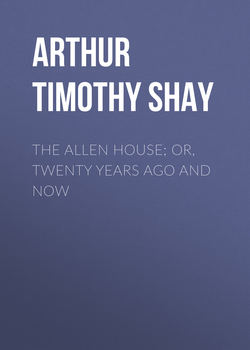Читать книгу The Allen House; Or, Twenty Years Ago and Now - Arthur Timothy Shay - Страница 9
CHAPTER VIII
ОглавлениеThe appearance, manner, and bearing of the two strangers impressed me strongly. The elder had evidently moved in refined and cultivated society all her life. There was about her the air of “a lady, born and bred”—dignified, calm, easy, and courteous. The daughter was a lovely blossom on this stately stem—delicate, beautiful, sweet with the odors of innocence. I see her now as I saw her on that first night of our meeting—to my eyes a new born vision of loveliness.
I found Constance awaiting, with curious interest, my return. I was going right into the heart of this new wonder, and could not fail to bring back some revelation that would satisfy, in a measure, the excitement of mind produced by so singular an intrusion of strangers upon our quiet town. I answered her first look of inquiry by the words:—
“It is over. Another book of life is sealed up here to be opened in eternity.”
“Dead! Not dead?”
“Yes, Constance, Mrs. Allen is dead. Her spirit had passed away before my arrival.”
“How did she die?—from what cause?”
“From what I can learn she died in a fit of passion.” I then related all that I had seen and heard.
“But who can they be?” This query came as a natural sequence. “What right have they in the Allen House?”
“Whoever they may be,” I replied, “they act, or, at least, the elder of the two ladies acts as if her right there was not even open to a question. And, perhaps, it is not.”
“But what can they be to the Allens?”
“I will give you,” said I, “the benefit of my guessing on the subject. You recollect the story told about Captain Allen’s mother; how she went off a great many years ago with a stranger—an Englishman.”
Constance remembered all about this family history, for it was the romance of our town.
“My conclusion is that this lady is the sister of Captain Allen—the child that his mother took with her when she fled from her husband’s house. I am strengthened in this belief from the first impression of her voice, as if the tones had in them something familiar.”
We talked this matter over, looking at it in every way, until we satisfied ourselves that my conjectures must be true. The quiet manner in which they had intruded themselves, and taken possession of the house—unheralded as far as we knew—could not but present itself to our minds as a matter of special wonder. The more we conned it over the more we were puzzled. Before coming home I had called at an undertaker’s, and notified him that his services were wanted at the Allen House. Early on the next day I took the liberty of calling there myself. I sent up my name, and awaited, with some interest, my reception. The visit might be regarded as an intrusion, and I was prepared to receive a message from the lady asking to be excused. Not so, however. I had been seated only a few moments, when I heard the rustle of her garments on the stairs. My first glance at her face assured me that I was no unwelcome visitor.
“Thank you, Doctor,” she said, as she extended her hand, “for this early call. Our meeting last night for the first time can hardly be called a pleasant one—or the associations connected with it such as either of us might wish to recall.”
“Our control over events is so slight,” I made answer as I resumed my seat, “that we should separate unpleasant feelings as far as possible from any memories connected with them.”
A faint, sad smile just lightened up her placid face as she said, in reply to the remark.
“Ah, Doctor, that may not be. Lives are too intimately blended here for any one to suffer or do wrong without leaving a burden of sadness on other memories.”
“True; but the burden will be light or heavy according to our strength.”
She looked at me without replying, for the remark was so palpable, that it seemed to involve nothing beyond a literal fact.
“Or rather,” I said, “the burden will be heavy or light according to our state or quality.”
There was a sign of awakening interest in her countenance as if my remark had touched some hidden spring of thought.
“If we are right with ourselves,” I went on, “the disturbance produced by others’ misconduct will not reach very far down. The pressure of sadness may lie upon us for a season; but cannot long remain; for the pure heart will lift itself into serene atmospheres.”
“But, who is right with himself?” she said. “Whose heart is pure enough to dwell in these serene atmospheres? Not mine, alas!”
I looked into the suddenly illuminated face as she put these questions, in surprise at the quick change which had passed over it. But the tone in which she uttered the closing sentence was touched with tender sadness.
“Rather let me say,” I made answer, “in the degree that we are right with ourselves. None attain unto perfection here.”
